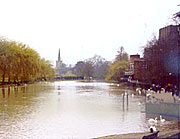 The actual date of Shakespeare's birth is not known, but,
traditionally, April 23, St George's Day, has been Shakespeare's accepted
birthday, and a house on Henley Street in Stratford, owned by William's
father, John, is accepted as Shakespeare's birth place. If Shakespeare was
indeed born on Sunday, April 23, the next feast day would have been St.
Mark's Day on Tuesday the twenty-fifth. St. Mark's Day was still held to
be unlucky, as it had been before the Reformation, when altars and
crucifixes used to be draped in black cloth, and when some claimed to see
in the churchyard the spirits of those doomed to die in that year. The actual date of Shakespeare's birth is not known, but,
traditionally, April 23, St George's Day, has been Shakespeare's accepted
birthday, and a house on Henley Street in Stratford, owned by William's
father, John, is accepted as Shakespeare's birth place. If Shakespeare was
indeed born on Sunday, April 23, the next feast day would have been St.
Mark's Day on Tuesday the twenty-fifth. St. Mark's Day was still held to
be unlucky, as it had been before the Reformation, when altars and
crucifixes used to be draped in black cloth, and when some claimed to see
in the churchyard the spirits of those doomed to die in that year.
William Shakespeare was born in 1564, in Stratford-upon-Avon. Located
in the centre of England, the town was (and still is) an important
river-crossing settlement and market centre. His father, John, trained as
a glove-maker and married Mary Arden, the daughter of Robert Arden, a
farmer from the nearby village of Wilmcote.
 |
| Rear garden of
Shakespeare's Birthplace |
We do not know when or why Shakespeare left Stratford for London, or
what he was doing before becoming a professional actor and dramatist in
the capital. There are various traditions and stories about the so-called
'lost years' between 1585 and 1592, a period for which there is virtually
no evidence concerning his life. One tale tells how he was caught poaching
deer in Charlecote Park, near Stratford, and went off to London to avoid
prosecution. A plausible early tradition claims Shakespeare was a
schoolmaster for some years. When he was growing up, drama was a
significant part of Stratford's social life. Not only did local people put
on amateur shows, but the town was visited regularly by London-based
companies of actors and Shakespeare may have joined one of them.
Shakespeare's first printed works were two long poems, Venus and Adonis
(1593) and The Rape of Lucrece (1594). 1n 1594, Shakespeare joined others
in forming a new theatre company, under the patronage of the Lord
Chamberlain, with Richard Burbage as its leading actor. For almost twenty
years Shakespeare was its regular dramatist, producing on average two
plays a year. Burbage played roles such as Richard III, Hamlet, Othello
and Lear.
Drama was a nation-wide activity in Shakespeare's time but only in
London were there buildings designed specifically for performing plays.
Performances took place in the afternoons, with the actors playing on a
raised stage which projected halfway into the theatre. All the women's
roles were performed by boys. The audience, which either stood in the yard
around the stage or sat in the galleries, represented a wide social mix of
people, but actors were generally regarded as rogues and vagabonds.
Some of Shakespeare's most famous tragedies were written in the early
1600s, including Hamlet and, after James I's accession, Othello, King Lear
and Macbeth.
 |
| Holy Trinity
Church, where Shakespeare is buried, and the River
Avon |
From around 1611 Shakespeare seems largely to have disengaged himself
from the London theatre world and to have spent his time at his Stratford
house, New Place. In March 1616 he signed his will, in which he left
substantial property and other bequests to his family and friends,
including theatre colleagues in the King's Men.
Shakespeare died in Stratford, aged fifty-two, on 23 April 1616, and
was buried in Holy Trinity Church two days later. Within a short time a
monument to him was put up, probably by his family, on the wall close to
his grave. His widow, Anne, died in 1623 and was buried beside him.
Shakespeare's family line came to an end with the death of his
grand-daughter Elizabeth in
1670. |